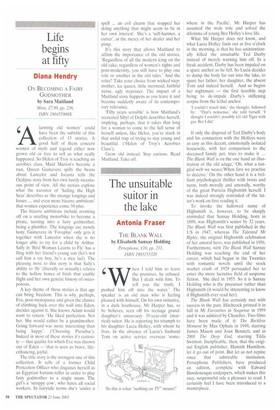Life begins at fifty
Diana Hendry
ON BECOMING A FAIRY GODMOTHER by Sara Maitland Maia, f7.99, pp, 236, ISBN 190455900X
]arming old women' could have been the subtitle of this collection of 15 stories. A good half of them concern women of myth and legend either now grown old or free to tell us what really happened. So Helen of Troy is teaching an aerobics class, Maid Marion's become a nun, Queen Guinevere spills the beans about Lancelot and Jocasta tells the Oedipus story from her own lustily incestuous point of view. All the stories explore what the narrator of 'Sailing the High Seas' describes as 'the strange longings and losses ... and even more bizarre ambitions' that women experience conic 50-plus.
The bizarre ambitions include zooming off on a snarling motorbike to become a pirate, turning into a fairy godmother, being a plumber. The longings are mostly lusty. Guinevere in 'Foreplay' only gets it together with Lancelot when she is no longer able to try for a child by Arthur. Sally in 'Bird Woman Learns to Fly' has a fling with her friend's young son (let's not call him a toy boy, he's a nice lad). The pleasing twist to this story is that Sally's ability to 'fly' (literally or sexually) relates to the hollow bones of birds that enable flight and her own genetic history of osteoporosis.
A key theme of these stories is that age can bring freedom. This is why, perhaps, Eve, post-menopause and given the chance of climbing back over the wall into Eden, decides against it. She knows Adam would want to return. 'He liked perfection. Not her. She would rather be a grandmother. Going forward was more interesting than being happy'. (Choosing Paradise'). Indeed in most of these stories it's curiosity — that quality for which Eve was thrown out of Eden — that is seen as brave, lifeenhancing, joyful.
The title story is the strongest one of this collection. It tells of a former Child Protection Officer who disguises herself as an Egyptian fortune-teller in order to play fairy godmother to a single mum. The girl's a 'stroppy cow', who hates all social workers. In fairytale terms she's 'under a spell ... an evil charm that stopped her doing anything that might seem to be in her own interest'. She's a 'self-harmer, a cutter', at the mercy of her dealer and her pimp.
It's this story that allows Maitland to affirm the importance of the old stories. 'Regardless of all the modern icing on the old cake, regardless of women's rights and post-modernity, you still have to play one role or another in the old tales.' And the roles? Take your choice from wicked stepmother, ice queen, little mermaid, faithful nurse, ugly stepsister. The impact of a Maitland story happens as you leave it and become suddenly aware of its contemporary relevance.
'Fifty years sensible' is how Maitland's recreated Sibyl of Delphi describes herself, implying, perhaps, that it takes that long for a woman to come to the full sense of herself unless, like Helen, you're stuck in that awful trap of trying to stay young and beautiful. (Helen of Troy's Aerobics Class').
Grow old instead. Stay curious. Read Maitland. Take off.


































































































 Previous page
Previous page